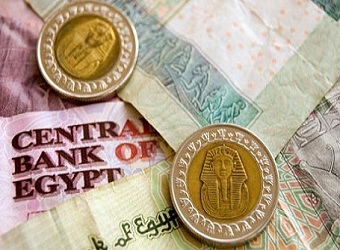Egyptian pound forwards strengthened for a second day after the country’s foreign currency reserves dropped less than economists’ forecasts.
Three-month non-deliverable forwards gained 0.4 percent today to 7.145 a dollar, indicating investors expect the currency to weaken 5.6 percent in the period, according to data compiled by Bloomberg. The contracts were trading as weak as 7.4 a dollar last month, the data show.
Reserves fell to $13.5 billion in February, the lowest level in at least 15 years, central bank data showed yesterday. That beat the $13.2 billion median estimate of five economists surveyed by Bloomberg. The better-than-anticipated figure was due to “precautionary” measures to ration the use of dollars, Nidal Assar, central bank sub-governor, said yesterday. Reserves have plunged 60 percent since the 2011 uprising that ousted Hosni Mubarak as investors and tourists shunned the country.
“The squeeze in NDFs is a product of people being happy we didn’t see a sharper drop in reserves,” Stephen Bailey-Smith, emerging markets strategist at Standard Bank Plc, said by phone. “There’s also a little more optimism about the potential of an IMF deal before the elections.”
Economic Plan
The government outlined an economic plan last week designed to help secure a $4.8 billion loan from the International Monetary Fund, including raising taxes on some goods and gradually lifting fuel subsidies. The IMF agreement has been on hold since November amid a political crisis between the ruling Islamist regime of President Mohamed Morsi and opposition groups. The National Salvation Front, the biggest opposition group, said it will boycott parliamentary elections set to start in April.
The yield on Egypt’s $1 billion of 5.75 percent dollar bonds was little changed at 7.13 percent as of 5:10 p.m. in Cairo, near the highest level since June, according to prices compiled by Bloomberg. That brings its increase this year to 111 basis points, or 1.10 percentage points.
The pound was unchanged at 6.7442 a dollar, having weakened about 8 percent since the central bank started auctioning dollars to local lenders in December to limit access to the U.S. currency. The regulator sold $518.1 million at the auctions in February, or 41 percent less than the previous month. Illegal currency dealers are charging as much as 7.4 pounds a dollar, the state-run news website Ahram Gate said last week.
“There’s clearly a shortage of dollars but the failure of the the black market premium to widen further shows it’s not becoming more severe,” Bailey-Smith said. “It’s still not a sustainable state of affairs. You have to restore the confidence cycle and I’m of the view that elections could deliver that.”
Business Week


